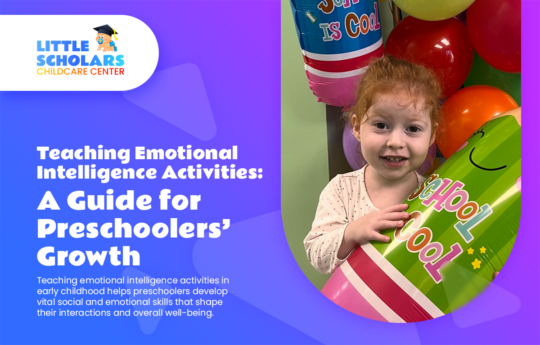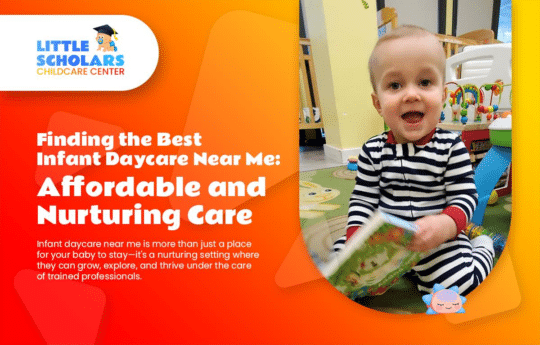
While most infant childcare centers accept babies as young as six weeks old, many parents wait until their kids are a little older to enroll them. If daycare is your preferred child care option, explore the many infant daycare options and the social-emotional benefits of each before deciding when your baby will begin daycare in New York.
Read on to find out when most newborns can start daycare, what types of 6 week old daycare options are available, when to begin, and what to look for in an infant daycare.
How early can babies start daycare?
In the United States, 32% of parents who need regular child care choose center-based daycare for their children [1].Most licensed child care centers accept infants as young as six weeks old.
However, deciding when to start daycare for early brain booting beginnings is a personal decision influenced by a variety of circumstances. These considerations could include:
- Whether you qualify for parental leave.
- The duration of your parental leave.
- Whether your leave is paid or not.
- Do you have alternative child care options?

Although newborns can begin daycare as early as 6 weeks, waiting a little longer can have some advantages. For example, it gives you time to form a relationship with your child, mend the umbilical cord, work out feeding and sleeping patterns, and adjust to a new life together.
According to the Bipartisan Policy Centre, because many working parents in the United States do not have access to paid parental leave and their families rely on their earnings, waiting until the infant is older to begin childcare is not always an option [2].
If you have no opportunity to take a paid leave and you’re going to enroll your child in one of our New York daycare facilities, we have listed some tips for busy parent lunches.
Understanding Daycare Options for a 6-Week-Old Baby
Depending on your area, you may have several options for your 6 week old daycare. Although child care facilities, which care for large groups of children, frequently refuse to accept babies under the age of six weeks, other types of daycare providers may be prepared to accept them earlier.
Whatever form of newborn daycare you choose in New York, you can be confident that the quality will be more important. Early child care benefits both children and families when the atmosphere is healthy and safe, the care is consistent, developmentally appropriate, and, for example, emotionally nurturing through arts music.
What to Expect in Infant Care Programs
Facilities for newborn in daycare provide care and supervision for groups of infants and children, which are frequently split by age. The inherent benefits of child care centers include:
| What to expect in infant care programs | Details |
|---|---|
| Reliable care coverage | Child care centers continue operating even when caring teachers or assistants are out sick or unavailable, providing families with consistent, dependable care. |
| State licensing & safety standards | Centers must follow strict state regulations regarding cleanliness, safety, staff training, caregiver-to-child ratios, and facility requirements, giving parents added peace of mind. |
| Opportunities for social development | Infants are exposed to a variety of adults and other children, helping them build early social skills, adapt to group environments, and experience different forms of interaction and engagement. |
| Structured daily routines | Babies follow predictable schedules for feeding, naps, diaper changes, and play, helping them feel secure and supporting the development of healthy habits and rhythms. |
| Multiple caregivers present | With several adults in each classroom or age group, infants receive shared attention, increased safety, and a wider range of care styles and interactions. |
| Daily activity reports | Many centers provide written or digital summaries detailing an infant’s meals, naps, diaper changes, mood, and activities, keeping parents informed and involved. |
| Connections to community resources | Centers can guide families to helpful services, such as parenting support groups, early intervention programs, or local health resources. |
| More affordable than in-home care | Center-based care is often less expensive than hiring a private nanny or in-home caregiver, making it a cost-effective option for many families. |
Child care facilities are the most formalized type of child care. They typically have set drop-off and pick-up times, prepaid cards, restrictions on whether sick children can be taken to daycare, and additional costs for specific services. Additionally, some centers only offer full-time care across disciplines.
How Little Scholars NYC Creates a Secure and Supportive Environment
Little Scholars NYC provides a supportive environment to control the physical and mental well-being of infants. All the Infant Daycare classes (3-12 months) are available at several locations: 52 Quentin Road, 448 Neptune Avenue, 104 West End Avenue, 4123 Avenue U, 1502 West 1st Street, 631 East 18th Street, 345 Adams Street, and 600 6th Avenue.
New York facilities follow all state licensing rules, STEAM learning, including high standards for cleanliness, child-to-staff ratios, emergency readiness, and safe sleep practices.
Our classrooms are intended to reduce dangers while yet encouraging developmental discovery. This structure of the Toddler and Preschool Daycare programs allows for surveillance, resulting in a setting that promotes trust in both infants and their families.

Caring Teachers and Infant Development Practices
Little Scholars NYC teachers use evidence-based practices to improve early brain power, physical, and socio-emotional development in all settings.
Caring teachers keep child-to-caregiver ratios low, engage newborns in appropriate sensory and motor activities, and establish predictable daily routines for feeding, sleeping, and playing. The key principles of how children develop are:
- Individualized Attention: Because of the low child-to-caregiver ratio, teachers are able to respond to each infant’s specific needs and developmental signals.
- Developmentally Appropriate Engagement: Structured sensory, motor, and cognitive activities promote skill-building and early learning.
- Consistent Routines and Responsive Care: Predictable daily schedules and attentive interactions foster emotional security and attachment building.
To summarize, continuous observation and organized reporting allow our caregivers to track milestones and customize newborn in daycare interventions. Responsive interactions throughout the day help children develop secure attachments and regulate their emotions.
Read about the core values for children, why they matter and how to teach them here.
Parental Tips for Transitioning a Newborn to Daycare
Youngster care provides your youngster with a new 6 week old daycare environment, including new people and routines. Your child’s transition to child care is more likely to go smoothly if you start preparing for it well in advance.
It is also crucial to begin gently. For example, if it works for your family, you could begin with short days of child care and stay with your child. Then you could leave your child for little amounts of time, gradually increasing to a full day.
Read about common signs of overstimulation in children and the best preventative practices used by caregivers here.
Get organised early
Organizing necessary items like lunches and clothing labels the night before (or earlier) will alleviate the stress of rushing out the door in the morning after holidays. This means you may concentrate on your child and their emotions during child care mornings. If you had a quiet morning at home, you are more likely to be calm when saying goodbye.
Stay at child care with your child
It’s a good idea to spend time at child care with your child while they adjust to being without you. You may read a book together, play quietly, or observe your child’s social-emotional learning at home. As you and your child become more accustomed to child care, you will be able to stay with them for shorter periods of time. You will gradually build a drop-off routine that is convenient for both of you.
When To Start Searching for Infant Daycare
It’s best to start exploring for childcare providers well before your kid arrives home. Child care centers require the most lead time since they must strictly limit the number of newborns they can accept at any one time.
If you know you’ll need to return to work within a few weeks of your baby’s birth, start looking into daycare for 6 week old choices right away. This allows you to focus on arranging child care that also follows allergy and germ protocols before preparing to return to work.
Little Scholars NYC has limited openings for infants across our Brooklyn and Chelsea locations. Start your search now to ensure your baby has a supporting environment ready when you return to work. Access Facility or Get the Admission today.
FAQ
What is the youngest age for daycare enrollment?
The Infant Program at Little Scholars NYC admits children as young as three months old in centers such as Downtown Brooklyn (345 Adams Street) and Chelsea (600 6th Avenue).
Іs daycare safe for a 6-week-old newborn?
A 6-week-old newborn can attend daycare if it is an infant-specific program with experienced caregivers and low staff-to-baby ratios, ensuring close, individualized attention. With careful selection of a safe, hygienic environment, daycare can support both the baby’s needs and the parents’ return to work.
How do caring teachers support infant development?
Caring teachers, for example, at 448 Neptune Avenue or 104 West End Avenue in Brooklyn, provide sensory-rich environments, STEAM learning, one-on-one involvement, and developmentally appropriate activities to promote motor, social, and cognitive growth.
They also maintain consistent infant-to-teacher ratios to promote individualized attention and responsive care, which aids infants in developing secure relationships.
How much is daycare for a 6-week-old in NYC?
A daycare for 6 week old expenditures in New York City typically range from $2,000 to $4,000 per month, depending on the location and program type. To acquire current prices, families must call the relevant center and request a quote based on capacity, hours, and program demand.
What does a secure environment mean in infant care?
A secure environment includes age-appropriate classes, regulated group sizes, sanitary measures, and trained staff to ensure infants’ safety and emotional stability.
In addition, we use safe sleep practices, carefully planned rest places, and continuous supervision to reduce risk and meet infants’ physiological needs.
What routines help newborns adjust to daycare?
At centers such as 631 East 18th Street, the infant schedule incorporates consistent cycles for feeding, learning across disciplines, sleeping, changing, and playing, allowing newborns to adjust to predictable daily rhythms.
How does Little Scholars NYC ensure baby safety and comfort?
We need full state certification for all of their childcare centers, along with stringent standards for hygiene, staff training, and child-adult ratios. The infant rooms are constructed with separate sleeping, eating, and sensory areas to promote newborn comfort, and staffing is structured to allow for personalized attention and supervision throughout the cards day.
References
- https://www.ffyf.org/resources/2025/04/survey-data-supports-the-need-for-better-access-to-child-care-for-parents-of-infants-and-toddlers/
- https://bipartisanpolicy.org/explainer/a-balanced-approach-paid-parental-leave-and-child-care/




